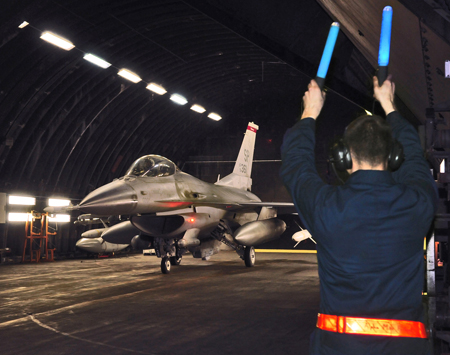NATO  Secretary General Anders Fogh Rasmussen announced Sunday that, effective immediately, the alliance would assume the lead role from the United States for all UN-sanctioned air and sea military operations in and around Libya. “This is a very significant step, which proves NATO’s capability to take decisive action,” said Rasmussen. This means the alliance will be in charge not only of the no-fly zone over northern Libya and the arms embargo, but also the air strikes meant to protect Libyan civilians from attack by Muammar Qaddafi’s regime. Defense Secretary Robert Gates said Sunday on NBC’s Meet the Press that, within the next week, the United States “will begin to diminish [its] commitment of resources” to the Libyan mission. “[T]he idea was that, over time, the coalition would assume a larger and larger proportion of the burden,” he said. He added, “Our air power has significantly degraded [Qaddafi’s] armor capabilities, his ability to use his armor against cities like Benghazi.” As of March 25, US aircraft had flown 529 sorties, coalition aircraft 346, since the air campaign began on March 19, according to Vice Adm. Bill Gortney, Joint Staff director. (Gates-Clinton transcript) (See also Gortney transcript and presentation slides) (See also AFPS report by Karen Parrish)
Secretary General Anders Fogh Rasmussen announced Sunday that, effective immediately, the alliance would assume the lead role from the United States for all UN-sanctioned air and sea military operations in and around Libya. “This is a very significant step, which proves NATO’s capability to take decisive action,” said Rasmussen. This means the alliance will be in charge not only of the no-fly zone over northern Libya and the arms embargo, but also the air strikes meant to protect Libyan civilians from attack by Muammar Qaddafi’s regime. Defense Secretary Robert Gates said Sunday on NBC’s Meet the Press that, within the next week, the United States “will begin to diminish [its] commitment of resources” to the Libyan mission. “[T]he idea was that, over time, the coalition would assume a larger and larger proportion of the burden,” he said. He added, “Our air power has significantly degraded [Qaddafi’s] armor capabilities, his ability to use his armor against cities like Benghazi.” As of March 25, US aircraft had flown 529 sorties, coalition aircraft 346, since the air campaign began on March 19, according to Vice Adm. Bill Gortney, Joint Staff director. (Gates-Clinton transcript) (See also Gortney transcript and presentation slides) (See also AFPS report by Karen Parrish)
Lt. Gen. Dan Caine, nominee to be chairman of the Joint Chiefs of Staff, told the Senate Armed Services Committee that the Defense Department needs to upgrade its electronic warfare capability and its EW training ranges; just as his predecessor said at his own confirmation hearing.